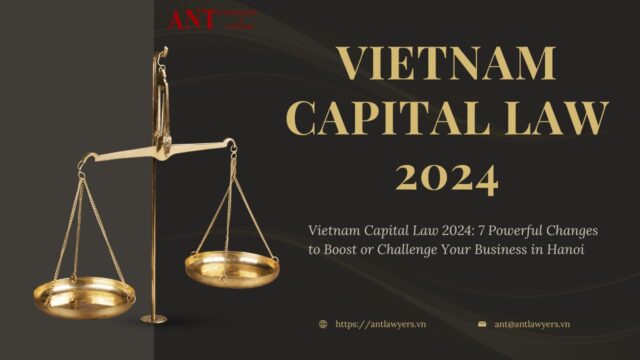A New Era of Opportunity or Complexity for Foreign Businesses in Hanoi?
Imagine standing in the heart of Hanoi, surrounded by its vibrant energy, historical elegance, and the relentless pace of economic development. This city, deeply rooted in its thousand-year-old legacy, is at a tipping point. The Vietnam Capital Law 2024—a groundbreaking legal framework—has just redefined how businesses operate, invest, and grow in the capital city.
For foreign investors and businesses, this isn’t just a policy update; it’s a recalibration of rules that will either open new doors or set unforeseen challenges. Whether you’re expanding operations, considering new investments, or launching your first venture, understanding the revised Vietnam Capital Law 2024, effective Jan 1st, 2025 will give you the clarity and edge you need to succeed in Hanoi’s evolving landscape.
In here, we will discuss the key provisions of the revised Capital Law, analyze its impact, and help you answer every critical question about doing business under the new regime.
What is the Vietnam Capital Law 2024?
The Vietnam Capital Law 2024 is the latest amendment to the legal framework governing Hanoi as the country’s political, cultural, and economic center. Approved by the National Assembly, this law grants special mechanisms and policies to Hanoi, aimed at fostering sustainable development, attracting investments, and addressing urban challenges.
The revised law reflects Vietnam’s strategic vision for Hanoi—transforming it into a dynamic economic hub while preserving its cultural and historical essence. For foreign businesses, the law introduces new opportunities alongside stricter regulatory oversight.
Why Was the Vietnam Capital Law Revised?
The Vietnam Capital Law 2024 was introduced to address three critical issues:
- Economic Modernization: Vietnam aims to elevate Hanoi to regional and global economic competitiveness, encouraging high-value industries and foreign investment.
- Urban Pressure: Hanoi faces challenges of overcrowding, traffic congestion, and strained infrastructure. The new law proposes solutions like urban decentralization and improved planning.
- Sustainability and Heritage: Balancing modern development with environmental sustainability and heritage preservation is at the core of the revisions.
Key Provisions of the Vietnam Capital Law 2024: What’s Changing for Foreign Businesses?
The revised Vietnam Capital Law 2024 introduces seven major changes that will impact how foreigners do business in Hanoi:
- Greater Autonomy for Hanoi’s Government
Hanoi’s authorities now have increased powers to enact regulations and policies tailored to its unique economic and social needs. This includes:
- Fast-tracked investment approvals.
- Custom tax and fee incentives for priority sectors like technology, healthcare, and education.
Impact: Foreign investors can expect streamlined processes but must stay updated on localized regulations that may differ from national laws.
- Special Investment Incentives
The law introduces policies to attract high-value investments, particularly in:
- Cultural and creative industries.
- Smart city development and infrastructure.
- Clean energy and green technologies.
Foreign businesses focusing on sustainable development and innovation are now prioritized, with incentives like reduced land rental fees and expedited licensing.
- Strengthened Rules on Land Use and Real Estate
Hanoi’s land resources will now be managed more rigorously to prevent speculation and inefficient use. Foreign businesses involved in real estate development must meet stricter requirements for:
- Project timelines and implementation.
- Environmental sustainability compliance.
Impact: While the real estate sector faces tighter controls, those meeting high standards can benefit from stable land policies.
- Urban Decentralization Policies
The revised law promotes urban expansion into Hanoi’s satellite cities to ease pressure on the city center.
Foreign businesses in construction, logistics, and manufacturing will find new opportunities in these emerging zones.
- Increased Focus on Environmental Protection
The law imposes stricter regulations on businesses concerning waste management, emissions, and environmental reporting. Enterprises adopting green technologies and sustainable practices will enjoy government support and incentives.
Impact: Businesses must align operations with sustainability goals or face penalties.
- Enhancing Cultural Heritage Management
Hanoi’s rich cultural heritage will be protected under tighter rules. Foreign investments in cultural tourism and heritage projects are encouraged but must comply with strict preservation guidelines.
Impact: The tourism and service sectors can leverage Hanoi’s unique cultural assets under clear, sustainable frameworks.
- Stricter Compliance and Penalties
The revised Vietnam Capital Law 2024 introduces higher penalties for businesses violating regulations on land use, investment delays, and environmental protection. Foreign businesses must maintain transparent reporting and compliance practices to avoid fines.
What Opportunities Does the Vietnam Capital Law 2024 Create for Foreigners?
The Vietnam Capital Law 2024 presents numerous opportunities for foreign businesses:
- Access to Emerging Sectors: High-value sectors like clean energy, digital infrastructure, and creative industries are open for foreign participation with preferential policies.
- Infrastructure Development: Expansion into Hanoi’s satellite cities offers opportunities for real estate developers, logistics firms, and manufacturers.
- Cultural Tourism and Heritage Investments: The law encourages sustainable tourism, offering openings for foreign businesses to invest in eco-friendly and heritage-focused projects.
- Sustainability Incentives: Enterprises adopting green technologies or sustainable practices can access tax benefits, grants, and government support.
Challenges Foreign Businesses May Face
While the revised Vietnam Capital Law 2024 is largely pro-business, it does introduce challenges:
- Regulatory Complexity: Greater autonomy for Hanoi’s government means foreign investors must navigate localized regulations that may differ from national standards.
- Compliance Pressures: Stricter environmental and land use policies demand higher operational standards and reporting obligations.
- Urban Decentralization: Businesses heavily dependent on central Hanoi must adapt to the shift toward satellite cities.
How Can Foreign Businesses Adapt to the Vietnam Capital Law 2024?
Here are key strategies to thrive under the new law:
- Stay Updated: Partner with local legal experts to monitor policy changes and ensure compliance.
- Focus on Sustainability: Adopt green technologies and practices to align with Hanoi’s sustainability goals.
- Explore Satellite Cities: Identify opportunities in emerging urban zones and infrastructure projects.
- Leverage Incentives: Target priority sectors like technology, cultural industries, and clean energy to benefit from incentives.
- Engage with Local Authorities: Build strong relationships with local government agencies for smoother regulatory navigation.
Why the Vietnam Capital Law 2024 Matters for Hanoi’s Future
The revised Vietnam Capital Law 2024 is not just a policy document—it’s a blueprint for Hanoi’s transformation into a modern, sustainable, and competitive global city. For foreign investors, the law provides clarity, opportunity, and a framework for growth, balanced with greater responsibilities and accountability.
By embracing this new legal landscape, businesses can position themselves as key players in Hanoi’s journey toward sustainable development and economic prosperity.
The Vietnam Capital Law 2024 marks a turning point for Hanoi and those who invest in its future. Whether you’re a seasoned business operator or a new investor exploring opportunities in Vietnam, understanding and adapting to this law will define your success.
Stay informed, act strategically, and leverage the incentives and opportunities created by the revised Vietnam Capital Law 2024. Hanoi is evolving—will your business evolve with it?
About ANT Lawyers, a Law Firm in Vietnam
We help clients overcome cultural barriers and achieve their strategic and financial outcomes, while ensuring the best interest rate protection, risk mitigation and regulatory compliance. ANT lawyers has lawyers in Ho Chi Minh city, Hanoi, and Danang, and will help customers in doing business in Vietnam.
How ANT Lawyers Could Help Your Business?
You could reach ANT Lawyers in Vietnam for advice via email ant@antlawyers.vn or call our office at (+84) 24 730 86 529




